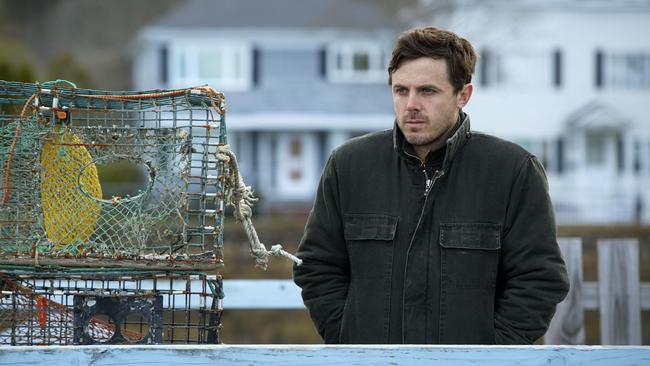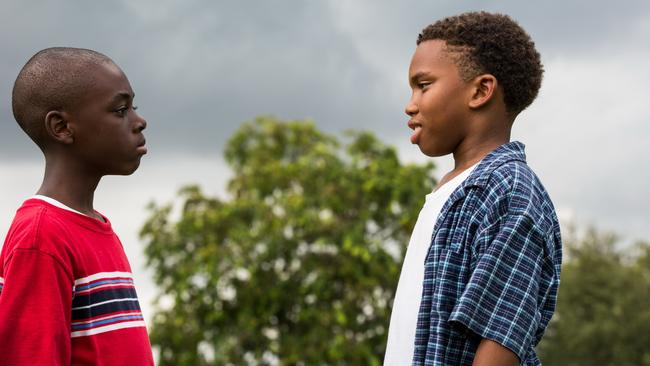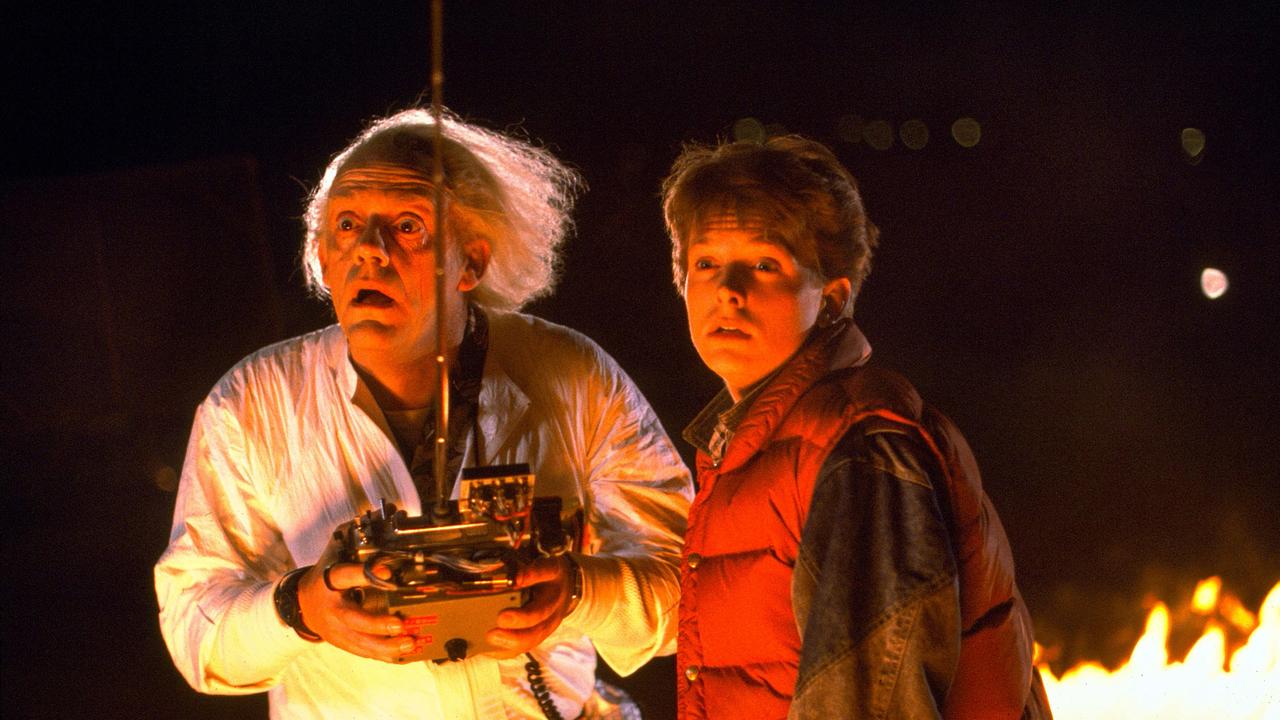
Writer-director Kenneth Lonergan is obsessed with bringing to the screen stories about loss and grief. Yet so rich and nuanced is his writing, so memorable his characters, so rooted in reality his themes that melancholy invariably evolves into acceptance and life reaffirmation in his films. His debut, You Can Count On Me (2000), dealt with adult siblings (Laura Linney, Mark Ruffalo) who have never fully recovered from the car crash that killed their parents when they were children. This was followed belatedly by the controversial Margaret (released in 2011) in which Anna Paquin gave a quite remarkable performance as a young woman who is partly responsible for the death of a stranger fatally injured by a bus.
With Manchester by the Sea, Lonergan’s protagonist, Lee Chandler (Casey Affleck), has never recovered from events that destroyed his family and ruined his life.
Lee lives in Boston, where he does menial work as janitor in an apartment building — clearing snow, cleaning toilets — and lives alone in a one-room apartment. He’s a sad, quick-tempered, friendless man whose lonely life undergoes a sudden change when he learns of the death of his older brother, Joe.
Reluctantly, forlornly, Lee drives back to the picturesque fishing village of Manchester-by-the-Sea, Massachusetts, his home town, where his brother lived, and here he discovers that Joe’s will requires him to care for his 16-year-old nephew, Patrick (Lucas Hedges).
Lee doesn’t want this responsibility; his domestic arrangements are unsuitable for sharing with a teenager he hardly knows. Patrick is equally unenthusiastic about the situation; a mature youth, he objects to the idea of leaving his home community to live in a city where he knows no one.

Meanwhile, flashbacks, inserted quite abruptly and often quite briefly, offer glimpses of happier times when Lee was married to Randi (Michelle Williams) and father of three small children. How that marriage ended, and with it Lee’s happiness, is gradually revealed while, at the same time, Lee and his nephew gingerly find their way around their new, unwelcome circumstances.
Patrick is a popular kid, a star hockey player, member of a rock band, and boyfriend of not one but two girls from his school. Patrick is also keen to meet his mother (Gretchen Mol), and the scene in which he confronts her and her new, uptight husband, played by Lonergan regular Matthew Broderick, is one of the film’s most potent. Another is Lee’s accidental encounter with Randi, in which he’s forced to come to terms with past demons.
The bonding between the monosyllabic, touchy Lee and the testosterone-charged Patrick becomes the core of Lonergan’s emotionally powerful film, but in every respect Manchester by the Sea is a gripping insight into the lives of ordinary but damaged people seeking happiness in a cruel world. Lonergan is a wonderful director of actors, and Affleck has never been better, while he has an excellent foil in young Hedges. The other actors have less to do, but every one is pitch-perfect, with Williams particularly fine in her tiny role.
Not a moment in the film is wasted; though on the long side, this is from start to finish a rewarding and strangely beautiful drama with a conclusion that is immensely satisfying in its touching understatement.

At this time of the year, thanks to the awards season, the serious film watcher has the opportunity to see more quality films than usual. But of course there’s a downside to having so many good, intelligent films bunched together; it’s almost too much of a good thing, and sometimes a very fine film risks being overshadowed by an even better one. I wonder, for example, if I would have enjoyed Moonlight more if I had seen it at another time of the year. The film comes to us loaded with praise from abroad, especially America, where it premiered at the small Telluride Film Festival last August.
The film, written and directed by Barry Jenkins and adapted from Tarell Alvin McCraney’s play In Moonlight Black Boys Look Blue, is divided into three chapters in which the protagonist, Chiron, is seen at three crucial stages of his life: as a bullied nine-year-old (Alex Hibbert), as a teenager discovering his sexuality (Ashton Sanders) and as an adult now living away from home (Trevante Rhodes).
Jenkins and McCraney are both from South Florida, and there’s at least in part an autobiographical element to the story of Chiron, who is raised by his drug-addicted mother, Paula (British actor Naomie Harris) — though “raised” is perhaps not the right word.
As a boy he is befriended by Juan (Mahershala Ali), a Cuban-born drug dealer with a feisty girlfriend (Janelle Monae); despite the fact that he’s supplying Paula, Juan becomes a surrogate father to Chiron, but his disappearance from part two of the film — while unexplained — is clearly significant.
The principal journey explored by Jenkins concerns Chiron’s gradual awareness that he’s gay, and the film’s key scene involves how he tentatively reaches out to a fellow student, Kevin (Jharrel Jerome). This sequence is handled with a restraint and tenderness typical of the film’s approach.
Having Chiron portrayed by three different looking actors at three stages in his life is one of the risks Jenkins takes. Another is his depiction of Juan, who is actually the first character we meet; he is seen as a kindly and caring man despite his noxious profession. Rarely if ever has a black drug dealer been given this kind of treatment in an American film, and that’s one of the reasons Moonlight is so interesting.
But I found it difficult to become as emotionally engaged as I was with Lonergan’s film, partly, I suspect, because the heavily accented and frequently mumbled dialogue is often so difficult to comprehend. There’s also the intrusively manic camerawork employed by cinematographer James Laxton in the early scenes, but mercifully this is soon abandoned in favour of more eloquent imagery.
The performances are all very good indeed, and the film’s serious, concerned tone suits the subject matter.
Still, Moonlight could have been a wrenching emotional experience and in this respect it falls somewhat short.
Chevalier, a strange and rather haunting Greek film by Athina Rachel Tsangari, is getting a very limited release. It’s about six men of varying ages who have rented a luxury launch to go fishing off the coast, and the fiercely competitive and rather ridiculous games they play to while away the time.
It has a good deal to say about men from the perspective of a woman and it’s never less than intriguing as these rather foolish characters challenge one another.
Manchester by the Sea (MA 15+)
4 stars
National release from Thursday
Moonlight (M)
3.5 stars
National release
Chevalier (MA 15+)
3.5 stars
Limited release



